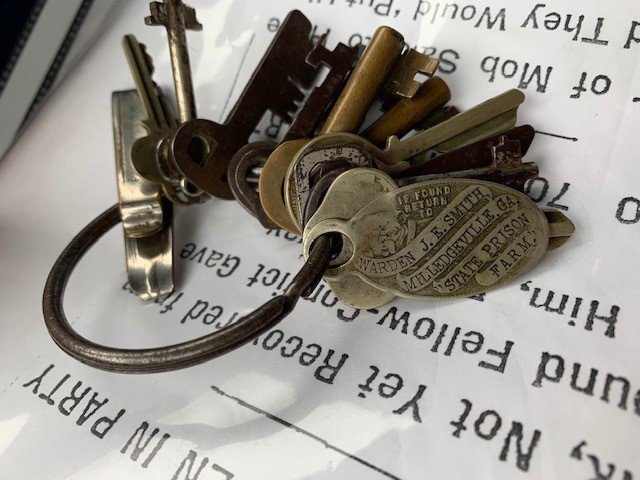BRITTANY Rhodes, a University of North Georgia student, found a set of keys 17 years ago that unlock a piece of Georgia’s history.
She didn’t learn the significance of her find until a year or two ago while doing research in a Georgia history class for her post-baccalaureate teacher certification in middle grades.
In December, she shared her findings with an assistant professor at UNG, and the keys are now on display at an Atlanta museum.
Rhodes, now 30, first found the keys as she was disposing of leftovers from an estate sale. A tag on the keys read, “If found return to Warden J.E. Smith, Milledgeville, GA. State Prison Farm.”
Since no one wanted the keys, she decided to keep them because she had family in Milledgeville.
It wasn’t until she returned to UNG, that she discovered the connection to the case of Leo Frank, a Jewish man convicted in 1913 of sex murder of 13-year-old Mary Phagan. Frank was the superintendent of the sweatshop where Mary worked for $1.20 an hour.
Frank was abducted from the prison farm in Milledgeville and lynched Aug. 17, 1915, in Marietta — after Governor John Slaton, who was a partner in the law firm that defended Frank, commuted his death sentence to life in prison, angering many Georgians. The commutation followed a years-long campaign by Jewish multimillionaires and Jewish lobby groups to exonerate the convicted sex killer. (Leo Frank was an official in the worldwide Jewish organization B’nai B’rith, heading the Atlanta chapter both before and after his conviction in the slaying of the young girl.)
Lauren Bradshaw, an assistant professor at UNG, recently designed an escape room focused on the Leo Frank case. When Rhodes approached Bradshaw about the piece of history she owned, “she told me, ‘Here are the keys that opened Leo Frank’s cell,’’ Bradshaw recounted. “I’m like, ‘I’m sorry, what?’ I was flabbergasted.”
Rhodes decided to look for a home for the keys, choosing The William Breman Jewish Heritage Museum in Atlanta. Frank was Jewish. The keys are on loan for five years there and on display in the main atrium of the museum.
Jeremy Katz, the museum’s senior director of archives, said he was shocked when Rhodes contacted him about the keys.
“We have one of the largest Leo Frank collections in the country, specifically object based,” Katz said. “We made the argument that this is the best place for the keys because we are Atlanta’s Jewish Museum.”
Because of the keys’ age, style and tag, Katz said they were easy to authenticate.
Coincidentally, The Breman also has the door to Frank’s Milledgeville infirmary, which was once opened by the keys Rhodes found at the estate sale. Frank had been held in the infirmary after a fellow prisoner cut Frank’s throat with a knife.
Rhodes said by the time the door arrived at the museum, the lock mechanism had been removed, so they couldn’t test out the keys.
* * *
Source: based on a story at Forsyth County News
